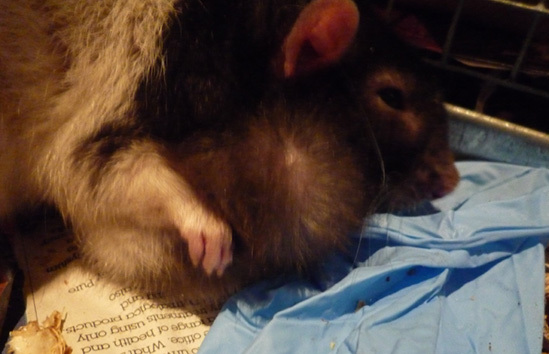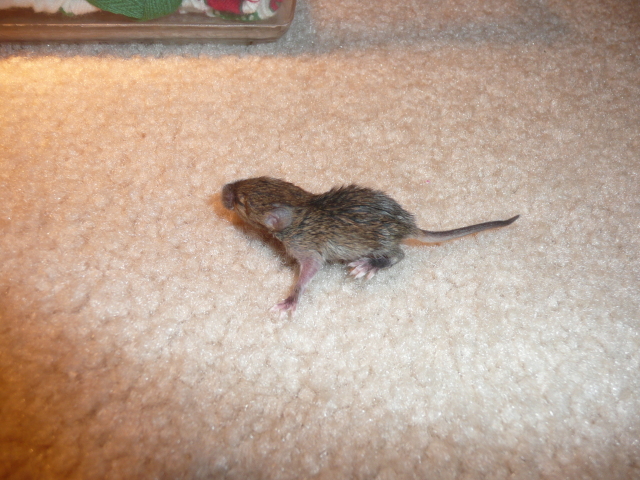QuestionI have a 19-24 mo. old neutered male rat who has been a joy to fellowship with as well as his 3 other male cage mates. 6 days ago we noticed a slight change in his walk but no obvious injury. 5 days ago his left eye began to bulge and his ability to control his hind quarters and tail worsened. The next morning, 4 days ago, I made an appointment with our vet, an x-ray was done and blood was taken. X-ray was normal, blood came back with problems...white count, specificly lymphosites, was through the roof as well as two of his liver enzymes. My vet does not have a diagnosis for his condition. Breathing is a bit labored but motor skills for the forward legs, head, neck, and body seem fine. He is mobile, urinates, and deficates fine. He is eating and drinking and does not give any signs of discomfort. The eye has not shown any changes nor do i believe has any vision loss, but the slightly bulged appearance remains, as well as the lower body motor skills problem. His back legs and tail are cooler to the touch than normal and more white-ish pink than red-ish pink.
Thanks for any thoughts or experience you can share.
Answerhttp://www.sandyscrittercity.com/leukemiainrats.htm
Please refer to my website, sandyscrittercity.com. I have the page for you above in the URL. I am leaning toward the fact that your rat may have Lymphocytic Leukemia. Many vets overlook this disease especially when dealing with a general practice vet and not a vet that is board certified avian/exotic vet.
Let me know what you think after reading the page on leukemia. This would explain the reasoning for his blood resluts such as his white blood cell count being high and also why his liver enzymes were off as well The eye bulge could be related to swollen lymph nodes. As far as his motor skills go, this could be totally unrelated and he could have hind leg paralysis setting in due to spinal nerve root compression. This is commonly seen in older males. You can find info on that on the page about elderly rats.
Hope this helps shed some light on what may be going on with your boy. Not the best news, of course, and also not carved in stone since I have not examined him in person, but its at least a start. I would also copy this for the vet to read. Again, many general vets are not aware of how common leukemia is in pet rats.

 male rat large rapidly growing tumour
Questionhannibal2
QUESTION: better photo is atta
male rat large rapidly growing tumour
Questionhannibal2
QUESTION: better photo is atta
 URGENTdying rat!!!!!!!
QuestionQUESTION: I have an orphaned baby rat. He is a
URGENTdying rat!!!!!!!
QuestionQUESTION: I have an orphaned baby rat. He is a
 bump, medicine
QuestionQUESTION: Hi Sandra. I sent you a question a wh
bump, medicine
QuestionQUESTION: Hi Sandra. I sent you a question a wh
 Hairless Rat w/growth between shoulder blades
QuestionQUESTION: I have a young hairless male, who is
Hairless Rat w/growth between shoulder blades
QuestionQUESTION: I have a young hairless male, who is
 Lump above pet rats eye and one eye sticking out more than the other
QuestionQUESTION: Hello.
We have a pet Dumbo rat and h
Lump above pet rats eye and one eye sticking out more than the other
QuestionQUESTION: Hello.
We have a pet Dumbo rat and h